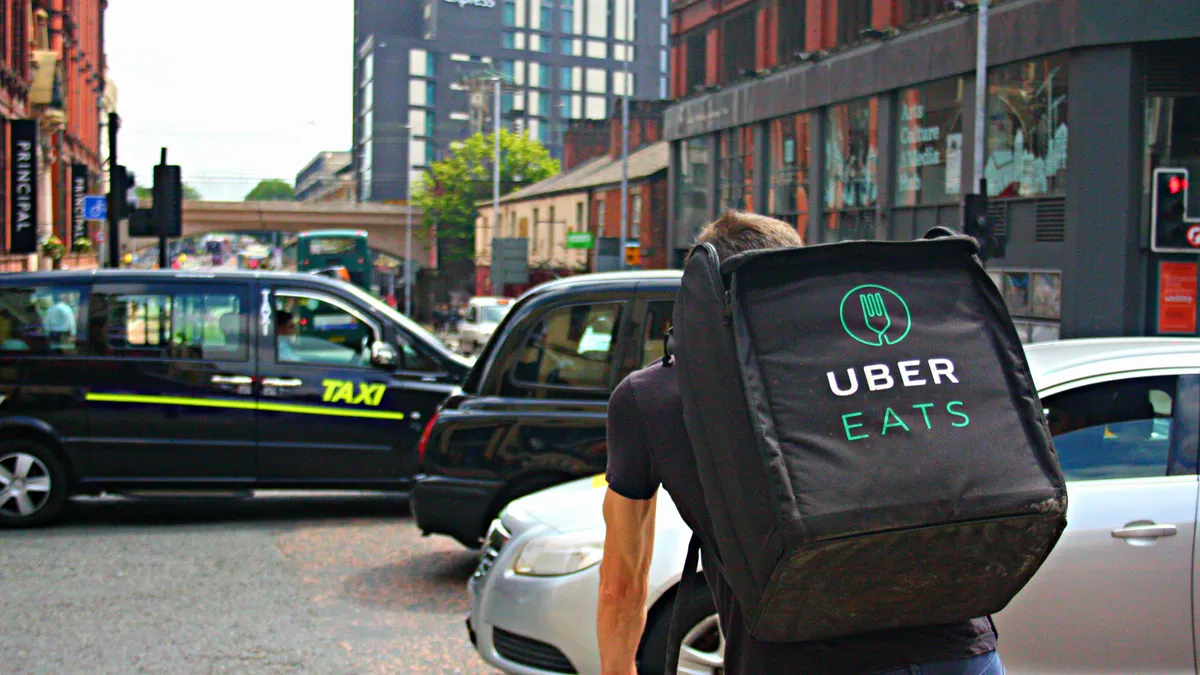UPDATE: Nov. 4, 2020: This article has been updated to include a statement from DoorDash.
Dive Brief:
- California voters passed Proposition 22, a ballot measure that exempts third-party delivery platforms from reclassifying drivers as employees. The vote was running 58% in favor of the measure and 42% against with over 70% of ballots counted.
- Uber, Lyft, DoorDash, Postmates and Instacart contributed roughly $200 million to support the measure, which allows the companies to work around AB-5, an initiative California Gov. Gavin Newsom signed into law in late 2019 that requires employers to reclassify independent contractors as employees.
- This election outcome preserves the business model of major food delivery companies in California. If Proposition 22 had not passed, the cost of transitioning gig workers to employee status would have financially gutted the already largely unprofitable restaurant delivery segment.
Dive Insight:
This result is a major victory for food delivery companies, who have fought bitterly against California's push to expand benefits and protections for gig economy drivers. These platforms argued that transitioning drivers to scheduled shift work undermines the flexibility that draws so many workers to the space, and that the majority of this workforce wants to retain their independence as contractors.
These companies also argued that they couldn't afford to bring on all of their current drivers as employees, and that a smaller labor pool would result in longer wait times. Uber CEO Dara Khosrowshahi said that if Proposition 22 didn't pass, ride prices could double, for example.
Uber and Lyft also said in August that if they had to shift their models to employed drivers, they would shut down their ride hailing business in the Golden State. Then a California appeals court granted an emergency stay Aug. 20, allowing the companies to continue their operations as is while they fought the order to reclassify their workforces. But then on Oct. 22, the state appeals court concluded that Lyft and Uber must reclassify California drivers as employees after all, and stated that the stay blocking the initial order would expire 30 days "after issuance of the remittitur in this appeal."
The passage of Proposition 22 ends this battle between California legislators and major delivery firms. It could also put a damper on any future challenges to this gig economy model across the country. Massachusetts, for example, sued ride-share companies this summer over driver reclassification issues.
"App-based ride-share and delivery drivers across the state will be able to maintain their independence, plus have access to historic new benefits," the companies’ Yes on 22 campaign said on its website. "Tonight’s victory clearly indicates this solution was preferred by a majority of drivers, customers, and voters, and a model for preserving the flexibility app-based rideshare and delivery drivers need and want while providing historic new benefits the rest of the country should follow."
These benefits include health insurance for drivers who work more than 15 hours of more per week, occupational-accident insurance coverage and other new protections. The opposition campaign, led by labor unions, argued that these concessions aren't enough. But the opposition only raised around $19 million for their cause, a sum that couldn't compete with Silicon Valley investment.
"Passing Prop 22 is a big win for Dashers, merchants, customers, and communities. Californians sided with drivers, recognizing the importance of flexible work and the critical need to extend new benefits and protections to drivers like Dashers... It’s what workers want and provides the protections and benefits they deserve," DoorDash said in an emailed statement.
Though Uber Eats, Postmates, DoorDash and competitors have eliminated an obstacle to profitability in the most populous U.S. state, it's possible that partner restaurants and diners have also now avoided extra costs that could have been passed on to them had the measure not passed.













